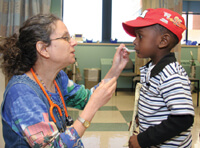Four Decades of Food Allergy Research
Food allergies are a growing problem. Having doubled in the last decade, food allergies now afflict about 12 million Americans, and cause an estimated 100,000 emergency-room visits and 150 deaths every year. Thirty-five years ago, however, when Professor of Pediatrics Allan Bock, MD, was beginning his career, food allergy was a backwater of medical research. The condition was rare and poorly understood. National Jewish Health was one of the only medical centers studying food allergies.
"No one seemed to know what was a real food allergy and what wasn't," said Dr. Bock. "National Jewish Health brought scientific rigor to a field that really needed it."
Gold Standard

Nursing staff carefully feed children increasing amounts of potentially allergenic foods in a food challenge, the gold standard of food-allergy diagnosis, which was developed at National Jewish Health.
In the mid- to late-1970s, nationally renowned pediatrician Charles May, MD, and a young postgraduate fellow, Dr. Bock, helped define the biological nature of food allergies. They established the food challenge as the definitive diagnostic test. In a food challenge, patients are fed tiny, then increasing, amounts of food and closely monitored for any allergic reactions. This helped sort out what was truly an allergic reaction to food and what was often caused by other things such as medications, allergen exposures by inhalation or contact, viral illness, exercise, or even panic.
In the decades since, National Jewish Health has continued to be a leader in the treatment of food allergies. In that time skin and blood tests have become widely used as diagnostic tools for food allergy, but food challenges remain the gold standard.
"Food challenges have allowed us to accurately identify allergenic foods for thousands of children over the years," said Professor of Pediatrics Dan Atkins, MD, who leads the food-allergy unit. "Maybe more importantly, they have allowed us to rule out many suspected allergies and add crucial foods back into children's diets."
Research Leading to Treatment?
Today, National Jewish Health researchers are conducting studies to better understand and treat food allergies. Assistant Professor of Pediatrics David Fleischer, MD, and his colleagues are feeding peanut-and egg-allergic people increasing doses of a protein extract from the foods to see if they can induce the patient's immune systems to tolerate the food. The hope is that these trials will lead to the development of the first preventive
treatment for food allergies.
"Today, the advice we offer food-allergy patients is to avoid the allergenic foods and carry epinephrine to treat accidental exposures," said Erwin Gelfand, MD, Chairman of Pediatrics. "If our research identifies the first truly effective food-allergy treatment, it will help prevent thousands of unnecessary emergency-room visits, hospitalizations and deaths."